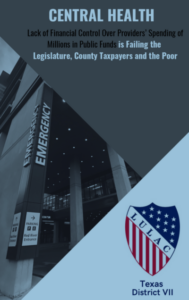Independent audit would determine what healthcare services needy Travis County patients got in return for $280 million in taxpayer money given to UT Dell Medical School

Today is Bastille Day, the French national holiday commemorating the storming of the fortress and prison in 1789 at the beginning of the French Revolution.
Here in Austin, Bastille Day 2022 is being marked by a momentous new commitment by the Travis County Commissioners Court to initiate a revolution in financial accountability for Central Health.
Since voters approved the formation of Central Heath in a May 15, 2004, election, the agency has collected more than $2 billion from Travis County property taxpayers. In the last eight years Central Health has given $280 million of that money to the University of Texas at Austin for the Dell Medical School. That money is due at $35 million a year for an initial period of 25 years under an Affiliation Agreement executed July 10, 2014. That totals $875 million in transfers of money from Travis County property taxes. Further, the contract automatically renews for additional 25-year terms at $875 million each unless a party notifies the other in writing at least a year before expiration.
But Central Health, whose only legal mission is to provide healthcare services to the neediest residents of Travis County, has given away its right to get information about how the University uses these funds. This has raised questions about whether Central Health’s payments are even lawful.
Now three Travis County Commissioners are poised to order Central Health to undergo a performance audit. The audit would determine, among other things, the specific amounts of healthcare services, if any, that UT Dell Medical School has provided to needy patients from those $35 million payments.
Commissioners Margaret Gomez, Brigid Shea, and Jeff Travillion in separate phone interviews told the Bulldog they would exercise the court’s statutory financial authority over Central Health and vote to order an independent third-party performance audit.
The draft order for the performance audit is scheduled to be discussed and voted on at the court’s July 26th meeting. Approving the audit requires at least three votes from the Commissioners Court. County Judge Andy Brown has not responded to the Bulldog’s repeated requests for interviews about the performance audit. Commissioner Ann Howard texted at 6:53pm last night, “I’m still reviewing the materials.”
There is strong public support for this action.
Groups including NAACP Austin, Texas LULAC District VII, and Travis County Taxpayers Union are supporting the action to order an independent third-party performance audit of Central Health. They are holding a press conference at 11:15am today at the court’s first-floor meeting location at 700 Lavaca St.
 They will present a 40-page report that goes into deep-dive detail about the agency’s shortcomings, including its failure to account for Dell Medical School’s use of $280 million in funding, amounting to an unconstitutional gift of public funds. The report claims Central Health lacks sufficient accountability and public visibility for money paid to third-party providers CommUnityCare, Community Care Collaborative, and Ascension Seton. Further, the report states Central Health has failed to implement meaningful improvements in accessibility and equity for the healthcare of poor Travis County residents.
They will present a 40-page report that goes into deep-dive detail about the agency’s shortcomings, including its failure to account for Dell Medical School’s use of $280 million in funding, amounting to an unconstitutional gift of public funds. The report claims Central Health lacks sufficient accountability and public visibility for money paid to third-party providers CommUnityCare, Community Care Collaborative, and Ascension Seton. Further, the report states Central Health has failed to implement meaningful improvements in accessibility and equity for the healthcare of poor Travis County residents.
Commissioners explain why audit needed
Precinct 4 Commissioner Gomez is the longest serving member of the Commissioners Court, having been in that job since January 1995. Gomez told the Bulldog in a July 7th phone interview that she views a performance audit as a way to help Central Health improve its services.
“The Legislature tied Central Health to us so we could approve its tax rate and budget,” Gomez said. “That gives us the authority to ask questions and order an audit…Everyone can stand improvement.”
She said that performance audits provide good recommendations on how to improve operations and she “does not understand Central Health’s hesitancy” in this matter.
But hesitant it remains.

Ted Burton, Central Health’s vice president of communications, in a July 8th email, repeated what he said for the Bulldog’s June 30th story, that the agency had a performance review in 2017 and is preparing for another in 2023. However, as the Bulldog reported, the 2017 review was not an audit and it made no attempt to address whether or how much funding was used by the medical school to deliver indigent healthcare services.
Gomez added, “Central Health’s main mission is to provide healthcare to the poor of Travis County. It really gripes me that they are in business to serve the poor but it took 18 years before Central Health’s groundbreaking (to provide services) in Eastern Travis County, where poor people live. That tells you what their priorities are.”
Precinct 2 Commissioner Shea told the Bulldog in a phone interview July 7th she favors requiring a performance audit for Central Health, adding on July 13th that she and Commissioner Gomez will cosponsor this initiative.
“I think we have a right and a need for a true third-party independent audit of Central Health and not one overseen by Central Health,” Shea said.
Precinct 1 Commissioner Travillion said in a July 11th interview, “I think that performance audits are useful tools.
“This community is interested in knowing Central Health is serving the poorest part of it. The community voted to make sure indigent care was going to be a reality and be effective. Periodically it’s really important for us to sit down, observe how the healthcare district does business, and make sure our invested dollars are producing healthcare services in the poor parts of our community.
“We learned in the pandemic that the last clinics opened up were in the eastern crescent—and they closed without notification to the commissioners court or the communities they were serving. That’s unacceptable for a district that’s funded in this way.
“I grew up with the Texas Performance Reviews under Texas Comptroller John Sharp. The philosophy was periodically to look at what you’re doing. What did the legislation or ordinance require you to do? Are you fulfilling that mission? You need to have an operating plan and have key performance indicators. Are there economies of scale? It benefits any organization to periodically evaluate itself and adjust to changes in the community and identify things we can measure and do better.
“I really think that this process will be a win-win. This for me is not about anger or distrust. It’s to make sure things we do with public dollars are transparent and people get to understand why we did what we did… If you are wealthy you’ve got thousands of dollars and you can drive your car to get healthcare. When you are poor you should have the means to get to a doctor in a reasonable time on public transit and have people responsive to you when you get there.”
Bulldog investigation shows no intent to provide services
The Bulldog reported June 30th that Central Health’s $35 million annual payments to Dell Medical School are an unlawful “gift of public funds” that exceed the agency’s statutory authority. University budget documents published online plainly state that the Dell Medical School has no intention of providing healthcare services to low-income patients in return for these funds.
UT’s budget classifies the money received from Central Health as “nonoperating.” This is defined as “Funding received from state or local governments for which no exchange of goods or services is perceived to have occurred (including) funding for the U.T. Austin Medical School provided by the local healthcare district.”
That point was reinforced by the University’s July 11th response to the Bulldog’s public information request for a list of goods and services provided to the needy healthcare patients of Travis County in return for the $35 million a year that Central Health transfers to UT for use by the UT Dell Medical School.
“The University has completed its search and determined that we do not maintain information that is responsive to your request,” attorney Bob Bonner-Davis wrote. “Specifically, the $35 million annual payment by Central Health to UT Austin is for Permitted Investments, as set forth in the…(Affiliation) Agreement.”
In plain English that means the University intends to continue using money collected from Travis County property taxpayers in any way it sees fit. State statutes that restrict the use of Central Health’s funds to paying for healthcare services for needy county residents are of no concern to the university.
Lawyers shore up legal authority
Some members of the Commissioners Court initially questioned whether the Court has authority to order the performance audit and, if so, whether they can require Central Health to pay for it.

To allay those concerns and provide solid legal justification, a group of 10 lawyers on July 7th signed a 12-page legal position paper that says, in effect, the Commissioners Court has both the authority and the responsibility to order the performance audit be done and can require Central Health to pay for it.
The lawyers are Fred Lewis, who wrote the paper, former Travis County Judge Bill Aleshire, David Brooks, Roger Borgelt, Bill Bunch, Michael Hebert, Lauren Ice, Robert “Bob” Ozer, Marisa Perales, and Brad Rockwell. Former Travis County Auditor Susan Spataro, who characterized the $35 million transfers as an unlawful “gift of public funds,” also signed on.

The star witness, so to speak, is David Brooks. He is particularly qualified to opine on these matters. He is the author of West’s Texas Practice series focusing on County and Special District Law. Central Health is by definition a special district, meaning its actions are strictly limited to what state law prescribes.
First published in 1989 and now in its second edition of three volumes, the Texas Practice Series are maintained in the law libraries in major universities all over Texas and beyond. Chapter 26 in this series covers healthcare and provides extensive information about provisions in state law dealing with the creation and operation of hospital districts, which is the formal classification of the Travis County Healthcare District (aka Central Health).
In a July 7th interview, Brooks was unequivocal: “The Health and Safety Code Chapter 281 speaks about hospital districts and clearly gives Travis County the authority to conduct audits and dictate accounting methods for the healthcare district.”
In a follow-up email, Brooks added, “It is a universal requirement that public entities, from the state on down, be subject to audits to ensure that public money is accounted for and is properly used. This may be achieved by public auditors, from the state auditor to the county auditor, or an outside independent auditor. For hospital districts, Chapter 281 of the Health and Safety Code grants broad authority to the commissioners court in counties with a population of 190,000 or more to ‘prescribe the method of making purchases and expenditures’ as well as ‘accounting and control procedures.’…
“Audits and auditors are important and essential. In my book, I cite a report that calls the county auditor ‘the lynchpin around which the county government turns.’ Without an audit of Central Health the taxpayers have little knowledge of what was done with their money.”
What the proposed audit would entail
The draft order for the audit calls for the Commissioners Court to prescribe the terms of a Request for Proposal and within 45 days select an independent third-party firm to conduct the performance audit. Central Health would be required to pay for it.
The draft states the audit firm selected will be an independent third-party, without potential or actual conflicts of interest with Central Health or its affiliate components, because of prior or ongoing relationships with Central Health, the Community Care Collaborative, CommUnityCare, Dell Medical School or the University of Texas at Austin.
The audit firm will have wide experience in professional healthcare organizational performance, accounting, management, and auditing.
The audit firm will report solely to the Travis County Commissioners.
If approved the order would require the audit firm within 90 days to determine the specific amount of healthcare services provided by Dell Medical School from the $35 million annual payments.
The audit firm would be required to complete a number of additional tasks within 180 days. A written report of audit results would be presented to the Commissioners Court and “made fully public.”
 Trust indicators: Ken Martin has been doing investigative reporting in the three-county Austin metro area since 1981. His aggressive reporting twice garnered first-place national awards for investigative reporting. Both of those projects resulted in successful criminal prosecutions. His 2011 investigation of the Austin City Council triggered a 20-month investigation by the Travis County attorney that resulted in the mayor and council members signing deferred prosecution agreements to avoid being charged, tried, and if convicted serving one to six months in jail and forfeiting their elective offices. He’s been investigating and reporting on Central Health since 2018. See more on Ken on the About page. Email [email protected]
Trust indicators: Ken Martin has been doing investigative reporting in the three-county Austin metro area since 1981. His aggressive reporting twice garnered first-place national awards for investigative reporting. Both of those projects resulted in successful criminal prosecutions. His 2011 investigation of the Austin City Council triggered a 20-month investigation by the Travis County attorney that resulted in the mayor and council members signing deferred prosecution agreements to avoid being charged, tried, and if convicted serving one to six months in jail and forfeiting their elective offices. He’s been investigating and reporting on Central Health since 2018. See more on Ken on the About page. Email [email protected]
Who funds this work? This report was made possible by contributions to The Austin Bulldog, which operates as a 501(c)(3) nonprofit for investigative reporting in the public interest. You can help support this independent coverage by making a tax-deductible contribution.
Related documents:
Affiliation Agreement, The University of Texas at Austin, Central Health, and Community Care Collaborative, July 10, 2014 (49 pages)
Atchley & Associates Independent Accountants’ Report, August 18, 2017 (6 pages)
Central Health Red Flags Report, March 23, 2022 (20 pages)
Central Health management response to Germane Solutions performance review, February 12, 2018 (7 pages)
Central Health press release, Auditor reports “no findings” after reviewing Central Health-related Dell Med School financial transactions, August 31, 2017 (1 page)
Germane Solutions contract, June 22, 2017 (17 pages)
Glossary of Terms included in the UT Austin Operating Budget, Fiscal Year Ending August 31, 2022 (1 page)
Plaintiffs’ Original Petition, Birch et al v Travis County Healthcare District, October 18, 2017 (7 pages)
Plaintiffs’ First Amended Original Petition, Birch et al v Travis County Healthcare District, March 21, 2022 (10 pages)
Related Bulldog coverage:
Central Health’s $35 million payments to Dell Medical School an unlawful ‘gift of public funds’ that exceed statutory authority, June 30, 2022
New documentary takes aim at diversion of indigent healthcare funds, November 15, 2021
Central Health $76 million of bonds for new real estate, September 1, 2021
Central Health plans $63 million headquarters, July 6, 2021
Central Health settles Wallace lawsuit, April 27, 2021
Former Central Health exec sues for $1 million-plus, November 5, 2020
When the Me Too movement collides with Black Lives Matter something’s gotta give, October 30, 2020
Central Health manager’s ethics questioned, September 21, 2018
Central Health sponsorships top $200,000, May 2, 2018
Central Health’s checkup delivered, February 14, 2018
Lawsuit challenges Central Health spending, October 18, 2017
Central Health financial policies hotly debated, September 29, 2017
Dining and shining on taxpayer dollars, March 30, 2018







